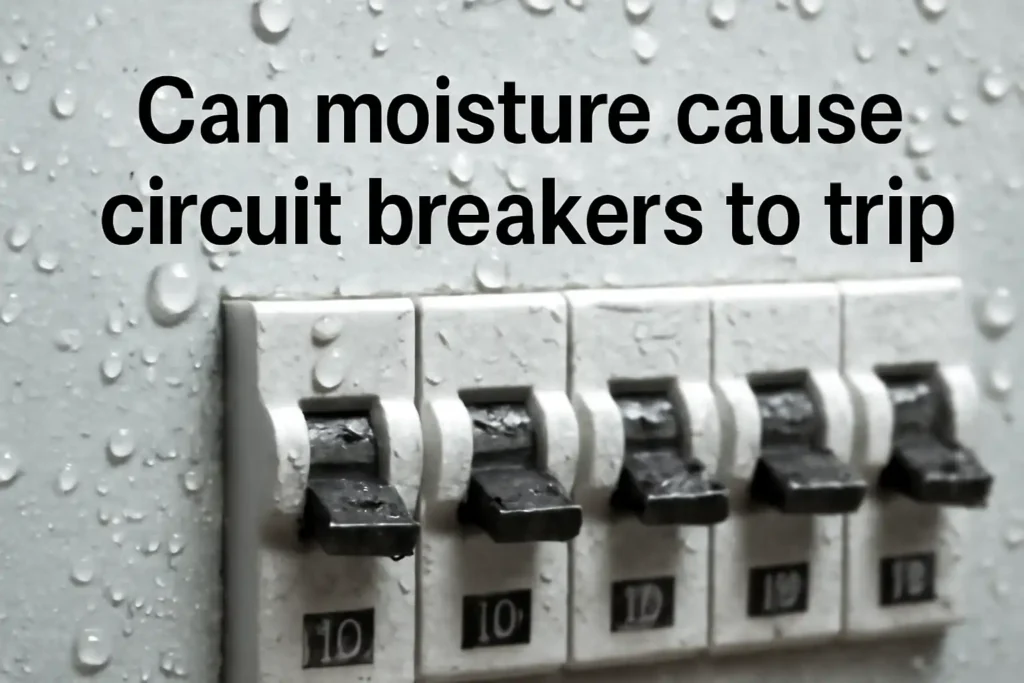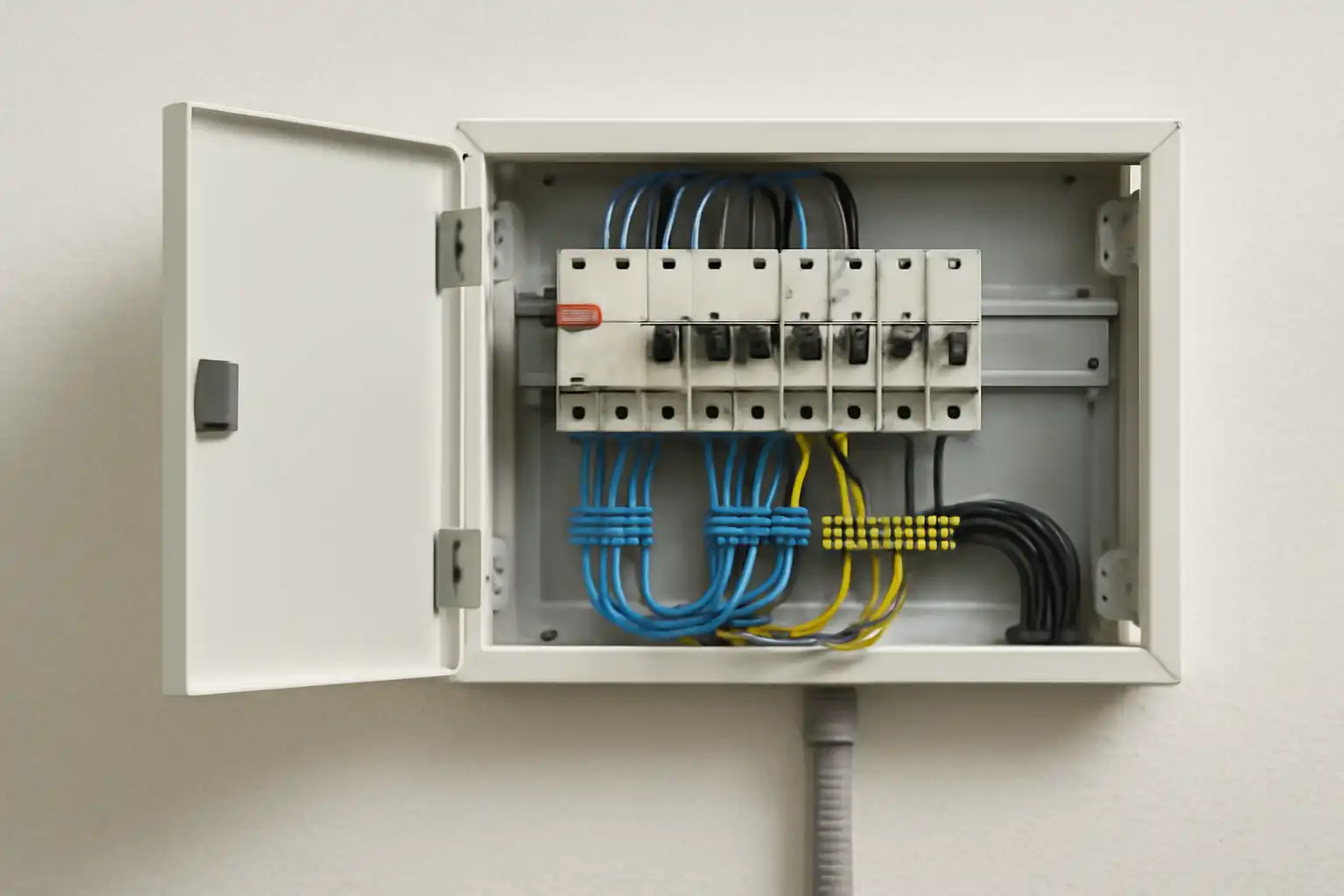Moisture can mess up electrical systems by allowing electricity to flow incorrectly. Water carries electricity, causing it to leave its proper path. This leads to issues like ground faults, short circuits, and rusting. For example:
- Ground faults happen when water connects the hot wire to the ground. GFCIs (Ground Fault Circuit Interrupters) sense this and shut off power to keep you safe.
- Rust from moisture makes wires harder to use, causing heat and potentially causing the circuit breaker to trip.
- Short circuits occur when water touches bare wires, allowing too much electricity to flow.
These problems can result in a circuit breaker tripped. This highlights the importance of keeping water away from electrical systems.
Key Takeaways
- Water can cause problems like ground faults and short circuits. These issues make circuit breakers shut off. Keep water away from wires to avoid this.
- Put GFCIs in places like bathrooms and kitchens. They stop power fast during problems, keeping you safe from shocks.
- Check outlets and wires often for water damage. Finding problems early can stop fires and save money on repairs.
- Cover outdoor outlets and lights with weatherproof covers. This easy step keeps rain and moisture from causing electrical trouble.
- If you think water is causing problems, call an electrician. They can find hidden damage and make sure your system is safe.
Why does moisture trip circuit breakers?
Ground faults from water contact
Water can let electricity flow where it shouldn’t. When water gets into an electrical system, it may connect the hot wire to the ground. This is called a ground fault. You might see this in bathrooms, kitchens, or outdoor outlets where water is common. Ground faults are risky because they can cause shocks or fires. Devices like GFCIs are made to find these faults and turn off power fast. This keeps you and your home safe.
Tip: If your breaker trips often in wet areas, check for water near outlets or appliances. Adding GFCIs can make things safer.
Short circuits from water
Water can also cause short circuits. These happen when electricity takes the wrong path. For example, if water gets into an outlet or touches bare wires, it can link the hot and neutral wires. This makes too much electricity flow, and the breaker trips. Short circuits often happen in outdoor outlets, basements, or garages where water is more likely.
- Here are some dangers of water and short circuits:
- Water changes electricity’s path, causing dangerous problems.
- Wet wires with damaged insulation can start fires.
- In 2021, electrical issues caused 24,200 house fires, 295 deaths, and 900 injuries.
If you think there’s a short circuit, don’t touch the area. Turn off the power and call an expert to check the wiring.
Corrosion and its effect on breakers
Over time, water can make metal parts in your electrical system rust. Rust weakens wire connections, making electricity flow poorly. This creates heat, which can trip the breaker. Rusty wires or parts are often found in damp places like basements, crawl spaces, or near leaks.
Rust doesn’t just trip breakers; it can ruin your system. Fixing it can be expensive. Regular checks can help you find rust early and stop bigger problems.
Note: Too much water in panels or outlets can cause rust and short circuits. Keeping these areas dry is key to staying safe.
Situations where moisture impacts electrical systems
Outdoor outlets and fixtures exposed to rain
Rain can harm outdoor outlets and fixtures without proper protection. Water entering an outlet may cause ground faults or short circuits. These problems often trip the circuit breaker to stop further damage. Outdoor lights, holiday decorations, and garden tools are common risks. Without weatherproof covers, these items are exposed to rain and moisture.
Tip: Use outlets made for outdoor use and add weatherproof covers. This easy fix helps stop moisture-related electrical issues.
Underground wiring affected by water seepage
Underground wiring has problems when water seeps in. Moisture can damage cable insulation, leading to rust and stress. Over time, this weakens the insulation and causes failures. “Water treeing” happens when moisture creates tiny cracks in the insulation. These cracks grow under stress and eventually break the wiring.
| Problem | What Happens |
|---|---|
| Water Treeing | Tiny cracks form in insulation from moisture and stress. |
| Corrosion | Insulation breaks down in wet conditions, causing damage. |
| High Electrical Stress | Voltage stress increases at weak spots, worsened by water. |
If you think underground wiring is damaged, call an expert. Ignoring it can lead to expensive repairs or safety risks.
Leaky electrical panels and water intrusion
Water getting into electrical panels is very dangerous. Leaks from roofs, pipes, or condensation can let water inside. This can rust parts, mess up circuits, and even cause sparks. Rusty parts create heat, which may trip the breaker again and again. Over time, this can ruin the whole system.
Check your electrical panel often for signs of water. Look for rust, stains, or discoloration. Fix leaks quickly to avoid serious damage.
Note: Keeping your electrical panel dry is key to a safe system.
Preventing circuit breaker tripped due to moisture

Checking outlets and wires for water damage
Regular checks help stop electrical problems caused by water. Look at outlets and wires for rust, stains, or odd smells. These signs often mean water has gotten in.
By checking your system, you can avoid fires and injuries. Inspections also show if old wiring needs updates. Older wires may not have good insulation, making them easier to damage by water.
Tip: Check your system once a year. If you see damage, call an electrician right away.
Why regular checks are helpful:
- Find problems early before they get worse.
- Lower the chance of fires caused by bad wiring.
- Keep your family safe and save money on repairs.
Adding weatherproof covers and fixtures
Outdoor outlets and lights face rain and wet weather often. Weatherproof covers protect these parts from water damage. They block water from getting into outlets and causing problems.
Strong weatherproof fixtures last longer in tough weather. Use GFCI outlets outside for extra safety. They shut off power if something goes wrong. Whether it’s outdoor lights or tools, weatherproofing keeps your system safe.
Why weatherproofing is important:
- Stops water from causing electrical problems.
- Keeps outdoor outlets working in bad weather.
- Lowers the chance of circuit breaker tripped events.
Note: Pick strong, good-quality covers for better protection. Cheap ones might break and cost more to fix later.
Using GFCIs to stop current leaks
GFCIs are great for stopping water-related electrical issues. They notice small current changes that could mean a ground fault. When this happens, they cut power quickly to prevent shocks or fires.
Since they were invented, GFCIs have made homes much safer. They’ve reduced electrocutions from home products by 95%. Install GFCIs in wet areas like bathrooms, kitchens, and outside outlets to protect your home.
Benefits of GFCIs:
- Stop current leaks fast.
- Prevent shocks and lower injury risks.
- Make wet areas like bathrooms safer.
Tip: If your home doesn’t have GFCIs, add them to wet areas first. They’re a small cost for big safety benefits.
Scheduling professional inspections regularly
Getting a professional to check your electrical system is smart. These checks find hidden problems like rust, bad wires, or broken parts. Fixing these early keeps your system safe and working well.
Electrical systems face wear and tear based on use and location. For example, equipment used a lot may break faster. Areas with moisture or dust can also cause quicker damage. Experts know how to spot these issues and fix them for you.
How often should you schedule inspections?
How often you need inspections depends on your system’s condition. Here’s a simple guide to help you decide:
| Source | How Often to Inspect | Extra Info |
|---|---|---|
| ANSI/NETA Maintenance Testing Standard | Depends on system condition and importance | Checks critical systems more often |
| Hartford Steam Boiler | Every three years | Do it sooner for tough conditions or key systems |
| General Recommendations | Monthly or quarterly for heavy use | Once a year for panels |
Use this table to plan your inspections. For example, if your system is in a damp area, check it more often.
Why inspections matter
Experts can find problems you might miss. They use special tools to test for rust, water damage, or other risks. They also follow rules from manufacturers to keep your system running right.
- Why regular inspections help:
- Spot rust or water damage early.
- Stop circuit breakers from tripping due to hidden issues.
- Make your system last longer.
Tip: Check panels once a year and high-use equipment more often. This saves money and keeps your home safe.
Factors to consider when scheduling inspections
Think about how much you use your system and where it’s located. Moisture, dust, or extreme weather can cause more problems. Equipment used a lot might need monthly checks, while others can wait a year.
- Things to think about:
- How often you use the equipment.
- If it’s in a wet or dusty place.
- What the manufacturer suggests.
By planning inspections based on your system’s needs, you avoid moisture problems and keep everything running smoothly.
Fixing moisture-related circuit breaker tripped issues
Drying out wet electrical parts
If water gets into electrical parts, drying them is key. Here are safe ways to remove moisture:
- Air Drying: Put the wet parts in a breezy spot. Make sure air reaches all sides to dry faster.
- Desiccants: Place the parts in a sealed box with silica gel. Leave them for 1-2 days to absorb moisture.
- Controlled Heat: Use a hairdryer or heat lamp on low heat. Be careful not to overheat delicate parts.
- Rice: For small items like plugs, bury them in uncooked rice to soak up water.
After drying, check for rust or discoloration. If you see damage, fix or replace the parts to stay safe.
Tip: Always turn off power before touching wet electrical parts. Safety comes first.
Replacing rusty or broken wires
Rusty wires can stop electricity from flowing properly. This often causes the breaker to trip again and again. Replacing bad wires keeps your system safe and working well. Start by drying nearby cables with silica gel before fixing the damaged ones.
When adding new wires, pick strong ones with good insulation to block future water damage. After replacing, check connections to make sure they’re tight and rust-free.
Note: Always inspect after repairs. This ensures the new wires work properly and avoids future problems.
Calling an electrician for ongoing issues
If water keeps causing electrical problems, call an expert. Licensed electricians can find hidden damage, like water near outlets or storm-related issues. They use special tools to check and fix your system safely.
Regular check-ups by electricians can stop future problems. For example, they can seal outdoor outlets and secure fixtures to handle rain. Their skills keep your system safe and running smoothly.
Reminder: If your power goes out often or you suspect water damage, call an electrician right away. Waiting can lead to bigger costs or safety risks.
Water can cause problems in your electrical system. It may lead to ground faults, short circuits, or rust. These issues often make circuit breakers trip. Outdoor outlets, underground wires, and leaky panels are common problem areas. To avoid this, use weatherproof covers and install GFCIs. Regular inspections also help find issues early. Systems that check for moisture, like gas pressure monitors, can spot problems fast. Fixing these issues quickly prevents bigger failures. Keeping up with maintenance and getting expert help keeps your home safe and your system working well.
FAQ
Why does moisture harm electrical systems?
Moisture helps electricity move where it shouldn’t go. This can cause ground faults, short circuits, or rust. These problems stop your electrical system from working right. Circuit breakers trip to keep things safe when this happens.
Why are outdoor outlets at higher risk for moisture?
Outdoor outlets deal with rain, humidity, and bad weather. Without covers, water can get inside and cause problems. This makes ground faults or short circuits more likely. These issues often trip your circuit breaker.
Why is rust bad for electrical systems?
Rust makes metal parts weaker and less able to carry electricity. This causes resistance, which creates heat and trips the breaker. Over time, rust can break connections and lead to expensive repairs or system failure.
Why should GFCIs be used in wet areas?
GFCIs find small leaks of electricity caused by water. They shut off power quickly to stop shocks and fires. Adding GFCIs in bathrooms, kitchens, and outdoor outlets makes your home safer.
Why are professional inspections important for moisture problems?
Electricians can find hidden water damage, like rusty wires or wet panels. Regular checks catch problems early, saving money and keeping your system safe. Experts make sure everything works properly and lasts longer.
The following information may be of interest to you
What are the warning signs of surge protector failure
What Leads to RCCB Malfunction and Damage
Analysis of Waterproof Capability of Solar Inverter
Comparison between residual current device and GFCI




